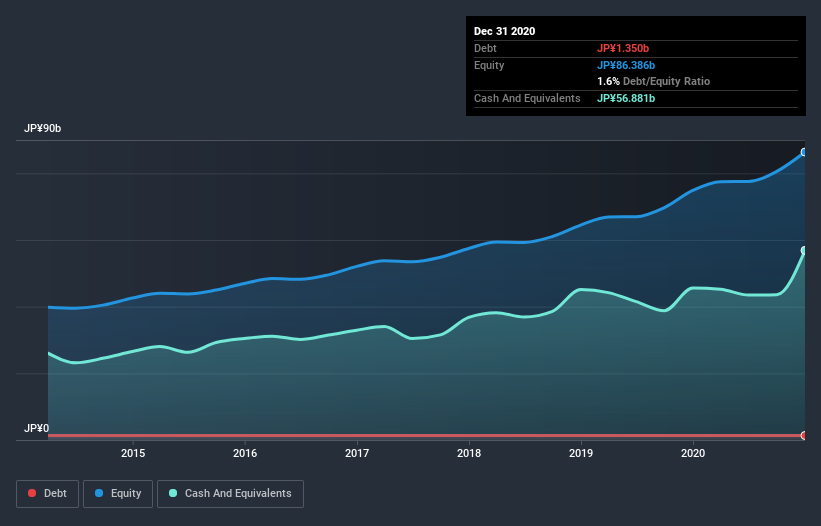Legendary fund manager Li Lu (who Charlie Munger backed) once said, 'The biggest investment risk is not the volatility of prices, but whether you will suffer a permanent loss of capital.' So it might be obvious that you need to consider debt, when you think about how risky any given stock is, because too much debt can sink a company. As with many other companies Workman Co.,Ltd. (TYO:7564) makes use of debt. But the real question is whether this debt is making the company risky.
What Risk Does Debt Bring?
Debt is a tool to help businesses grow, but if a business is incapable of paying off its lenders, then it exists at their mercy. Ultimately, if the company can't fulfill its legal obligations to repay debt, shareholders could walk away with nothing. However, a more usual (but still expensive) situation is where a company must dilute shareholders at a cheap share price simply to get debt under control. Of course, debt can be an important tool in businesses, particularly capital heavy businesses. When we examine debt levels, we first consider both cash and debt levels, together.
See our latest analysis for WorkmanLtd
How Much Debt Does WorkmanLtd Carry?
You can click the graphic below for the historical numbers, but it shows that WorkmanLtd had JP¥248.0m of debt in December 2020, down from JP¥1.35b, one year before. However, its balance sheet shows it holds JP¥56.9b in cash, so it actually has JP¥56.6b net cash.

How Healthy Is WorkmanLtd's Balance Sheet?
According to the last reported balance sheet, WorkmanLtd had liabilities of JP¥18.7b due within 12 months, and liabilities of JP¥3.19b due beyond 12 months. Offsetting this, it had JP¥56.9b in cash and JP¥11.5b in receivables that were due within 12 months. So it actually has JP¥46.5b more liquid assets than total liabilities.
This short term liquidity is a sign that WorkmanLtd could probably pay off its debt with ease, as its balance sheet is far from stretched. Succinctly put, WorkmanLtd boasts net cash, so it's fair to say it does not have a heavy debt load!
Another good sign is that WorkmanLtd has been able to increase its EBIT by 22% in twelve months, making it easier to pay down debt. There's no doubt that we learn most about debt from the balance sheet. But you can't view debt in total isolation; since WorkmanLtd will need earnings to service that debt. So when considering debt, it's definitely worth looking at the earnings trend. Click here for an interactive snapshot.
Finally, a company can only pay off debt with cold hard cash, not accounting profits. WorkmanLtd may have net cash on the balance sheet, but it is still interesting to look at how well the business converts its earnings before interest and tax (EBIT) to free cash flow, because that will influence both its need for, and its capacity to manage debt. Looking at the most recent three years, WorkmanLtd recorded free cash flow of 40% of its EBIT, which is weaker than we'd expect. That's not great, when it comes to paying down debt.
Summing up
While we empathize with investors who find debt concerning, you should keep in mind that WorkmanLtd has net cash of JP¥56.6b, as well as more liquid assets than liabilities. And we liked the look of last year's 22% year-on-year EBIT growth. So we don't think WorkmanLtd's use of debt is risky. Above most other metrics, we think its important to track how fast earnings per share is growing, if at all. If you've also come to that realization, you're in luck, because today you can view this interactive graph of WorkmanLtd's earnings per share history for free.
At the end of the day, it's often better to focus on companies that are free from net debt. You can access our special list of such companies (all with a track record of profit growth). It's free.
If you decide to trade WorkmanLtd, use the lowest-cost* platform that is rated #1 Overall by Barron’s, Interactive Brokers. Trade stocks, options, futures, forex, bonds and funds on 135 markets, all from a single integrated account. Promoted
Valuation is complex, but we're here to simplify it.
Discover if WorkmanLtd might be undervalued or overvalued with our detailed analysis, featuring fair value estimates, potential risks, dividends, insider trades, and its financial condition.
Access Free AnalysisThis article by Simply Wall St is general in nature. It does not constitute a recommendation to buy or sell any stock, and does not take account of your objectives, or your financial situation. We aim to bring you long-term focused analysis driven by fundamental data. Note that our analysis may not factor in the latest price-sensitive company announcements or qualitative material. Simply Wall St has no position in any stocks mentioned.
*Interactive Brokers Rated Lowest Cost Broker by StockBrokers.com Annual Online Review 2020
Have feedback on this article? Concerned about the content? Get in touch with us directly. Alternatively, email editorial-team (at) simplywallst.com.
About TSE:7564
Flawless balance sheet with solid track record.
Market Insights
Community Narratives



